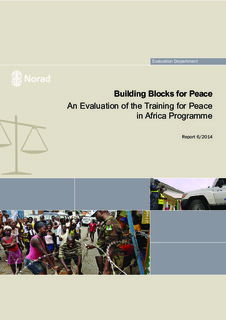Building Blocks for Peace An Evaluation of the Training for Peace in Africa Programme
Tjønneland, Elling N.; Wimpelmann, Torunn; Paterson, Anna; Albertyn, Chris; Fleming, David; Hills, Alice
Research report

Permanent lenke
http://hdl.handle.net/11250/2474975Utgivelsesdato
2014-11-07Metadata
Vis full innførselSamlinger
- Publications [1488]
Originalversjon
Oslo: Norad (Evaluation Department no. 6/14) 137 p.Sammendrag
The Training for Peace in Africa programme (TfP) was initiated in 1995 and has been fully funded by the Norwegian Ministry of Foreign Affairs. It is implemented to five partners organisations in Africa and Norway. The goal of the programme is to build sustainable African civilian and police peacekeeping capacity that are needed in order to implement multidimensional UN and AU peacekeeping mandates. TfP's engagement takes place through a combination of training assistance, recruitment assistance, applied research and policy support. This report presents the findings, conclusions and recommendations of an evaluation of this programme focusing on the 2010 - 2015 period. The evaluation had six objectives and 22 evaluation questions, but with a main focus on the training compoment - its volume, impact and cost effectiveness.
The report notes that there are still major needs for support to further development of African capacities to manage violent conflicts and to build peace. The capacities to plan, manage and implement are still constrained and the understanding of the role of the police and civilian components is limited in most African personnel contributing countries. The evaluation concludes that TfP is a complex programme without a clearly defined and articulated programme theory. Various internal programme factors (resources, diverse membership, structuring and management) and non-programme factors (complex and unpredictable external context) have contributed to TfP not effectively implementing a results-based management regime in which programme-wide outcomes are clearly defined, and then pursued by TfP partners. The evaluation also finds that the volume of training is impressive with more thant 3700 trainees attending TfP-supported courses in the evaluation period. Most are pre-deployment courses for individual police officers. The team concludes after extensive interviews wi